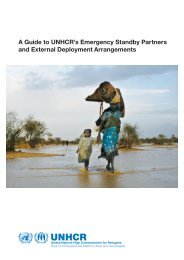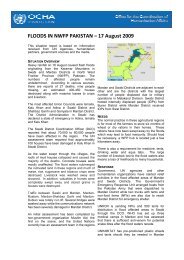Women, Girls, Boys and men - HumanitarianInfo.org
Women, Girls, Boys and men - HumanitarianInfo.org
Women, Girls, Boys and men - HumanitarianInfo.org
You also want an ePaper? Increase the reach of your titles
YUMPU automatically turns print PDFs into web optimized ePapers that Google loves.
of forced prostitution or sexual exploitation. In other cases,<br />
an individual refusing to adhere to socially or culturally<br />
defined roles <strong>and</strong> mores may face persecution.<br />
The 1951 Convention guarantees refugee wo<strong>men</strong>, girls,<br />
boys <strong>and</strong> <strong>men</strong> a range of rights <strong>and</strong> freedoms <strong>and</strong> stipulates<br />
the treat<strong>men</strong>t they are entitled to by the country of<br />
asylum. These include:<br />
• the right to seek asylum;<br />
• the right not to be returned to a country where the<br />
refugee’s life or freedom would be in danger (non-refoule<strong>men</strong>t);<br />
• the right to non-discrimination;<br />
• the right to docu<strong>men</strong>tation <strong>and</strong> to access work <strong>and</strong><br />
education; <strong>and</strong><br />
• the right to freedom of move<strong>men</strong>t, to access courts<br />
<strong>and</strong> practise one’s religion.<br />
In addition, Conclusions adopted by UNHCR’s ExCom<br />
articulate a number of principles to be followed <strong>and</strong><br />
measures to be taken by ExCom Member States as well<br />
as UNHCR to enhance the protection of displaced <strong>and</strong> returnee<br />
wo<strong>men</strong> <strong>and</strong> girls. Some of the Conclusions focus<br />
specifically on the protection of wo<strong>men</strong> <strong>and</strong> girls, while<br />
others focus on specific themes, such as preventing <strong>and</strong><br />
responding to sexual <strong>and</strong> gender-based violence.<br />
Humanitarian <strong>and</strong> human rights workers working with<br />
refugees <strong>and</strong> asylum-seekers play an important role in<br />
identifying, preventing <strong>and</strong> responding to gender-related<br />
protection risks. This may include: ensuring that asylum<br />
procedures are gender sensitive; guaranteeing that those<br />
suffering violations have access to <strong>and</strong>/or are referred to<br />
the proper authorities, whether national agencies, international<br />
<strong>org</strong>anizations, such as UNHCR, or non-govern<strong>men</strong>tal<br />
partners; assuring the provision of counselling<br />
<strong>and</strong> medical care as the circumstances require; preserving<br />
evidence <strong>and</strong> the confidentiality of any information;<br />
<strong>and</strong> ensuring proper follow-up of the case by the relevant<br />
authorities, agencies, guardians <strong>and</strong> legal representatives.<br />
In particularly serious cases, wo<strong>men</strong> <strong>and</strong> girls may need to<br />
be assisted in relocating within the country or resettling<br />
in a third country in order to ensure their safety.<br />
GuIdInG PrInCIPlES on InTErnAl<br />
dISPlACEmEnT<br />
The Guiding Principles on Internal Displace<strong>men</strong>t provide<br />
States, the UN <strong>and</strong> other human rights <strong>and</strong> humanitarian<br />
actors with important guidance relating to the protection<br />
of internally displaced persons. Although the Guiding<br />
I A s c g e n D e r h A n D b o o k<br />
Principles are not binding as such, they are based upon<br />
<strong>and</strong> reflect the protection offered by international human<br />
rights, humanitarian <strong>and</strong>, by analogy, refugee law. In addition,<br />
many countries have incorporated them into their<br />
national laws.<br />
The Guiding Principles provide protection against arbitrary<br />
displace<strong>men</strong>t, offer a basis for protection <strong>and</strong> assistance<br />
during displace<strong>men</strong>t <strong>and</strong> set out guarantees for<br />
safe return, resettle<strong>men</strong>t <strong>and</strong> reintegration. They apply to<br />
everyone who is internally displaced without discrimination<br />
of any kind, including on account of their sex or social<br />
status. The Principles pay particular attention to genderrelated<br />
problems common in situations of internal displace<strong>men</strong>t<br />
<strong>and</strong> guarantee, for instance:<br />
• freedom from gender-specific violence, including rape,<br />
forced prostitution <strong>and</strong> indecent assault, <strong>and</strong> freedom<br />
from slavery, including sale into marriage, sexual exploitation<br />
<strong>and</strong> forced labour of children;<br />
• the right to non-discrimination <strong>and</strong> equality, including<br />
as regards employ<strong>men</strong>t <strong>and</strong> economic activities;<br />
• the right to the full <strong>and</strong> equal participation of displaced<br />
wo<strong>men</strong> in the planning <strong>and</strong> distribution of basic supplies,<br />
in educational <strong>and</strong> training programmes;<br />
• the right to special attention to wo<strong>men</strong>’s needs for reproductive<br />
<strong>and</strong> psychological health care;<br />
• the right to respect of family life <strong>and</strong> family reunification;<br />
<strong>and</strong><br />
• the right of wo<strong>men</strong> <strong>and</strong> girls to personal identification<br />
<strong>and</strong> other docu<strong>men</strong>tation.<br />
ComPlEmEnTArITy oF<br />
InTErnATIonAl HumAn rIGHTS,<br />
HumAnITArIAn And rEFuGEE lAW<br />
International human rights, humanitarian <strong>and</strong> refugee law<br />
share a common goal in aiming to prevent <strong>and</strong> relieve suffering,<br />
<strong>and</strong> to protect the rights <strong>and</strong> freedoms of wo<strong>men</strong>,<br />
girls, boys <strong>and</strong> <strong>men</strong>. As such, they comple<strong>men</strong>t <strong>and</strong> reinforce<br />
each other, thus providing a comprehensive framework<br />
for the protection of wo<strong>men</strong>, girls, boys <strong>and</strong> <strong>men</strong>.<br />
These three bodies of law are, however, different in both applicability<br />
<strong>and</strong> scope. Humanitarian law is specific to armed<br />
conflict while refugee law only applies to refugees <strong>and</strong> asylum-seekers.<br />
Human rights law is broader <strong>and</strong> applies to all<br />
human beings during times of both peace <strong>and</strong> war.<br />
Human rights <strong>and</strong> humanitarian law have built-in constraints<br />
that influence their applicability <strong>and</strong> interpreta-<br />
T H e I n T e R n AT I o n A l l e G A l F R A m e w o R k F o R P R o T e C T I o n<br />
LEGAL FRAMEWORK











